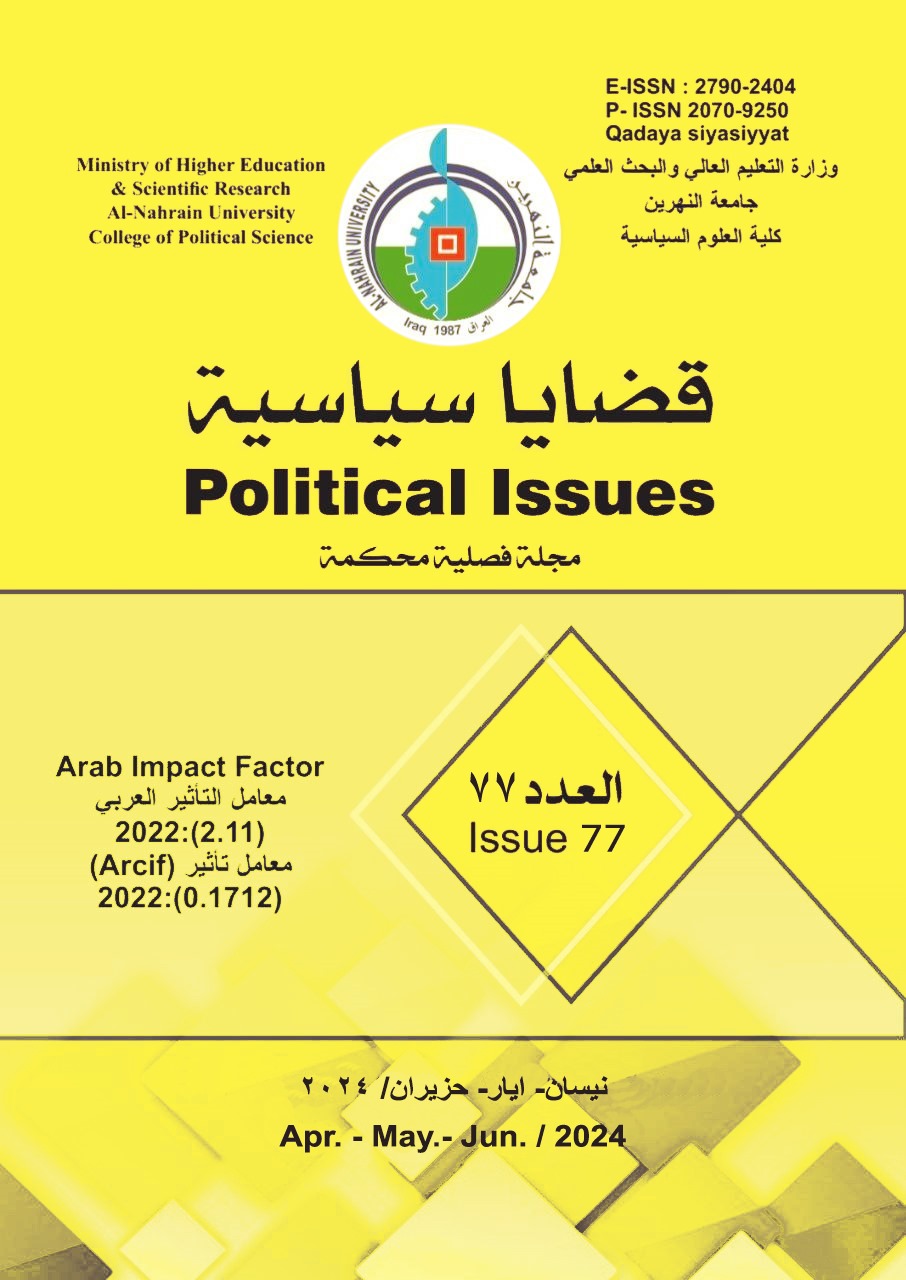استراتيجيات الموازنة للدول المتوسطة في العلاقات الدولية(موازنة التهديد وموازنة التحوّط)
DOI:
https://doi.org/10.58298/772024287الكلمات المفتاحية:
الموازنة، العلاقات الدولية، السياسة الخارجية، القوة، النظام الدولي، التحوطالملخص
المراجع
.e of Minilaterals in the Indo-Pacific،” ORF Issue Brief No. 490, Observer Research Foundation. Attribution Rajeswari Pillai Rajagopalan. September 2021.
“Minilateralism for Multilateralism in the Post-COVID Age،” Policy Report، S. Rajaratnam School of International Studies، January 2021. Some of these issues discussed in Amalina Anuar and Nazia Hussain. January 2021.
Aarshi Tirkey. (2021 SEP 01). Minilateralism: Weighing the Prospects for Cooperation and Governance. orf. New Delhi: Observer Research Foundation.
Abdul Fathah. (JUN 4, 2022). From Multilateralism to Minilateralism- A Conceptual Paradigm. Kerala, India: Defence Research and Studies.
Afe Adogame. (2004). the Berlin-Congo Conference 1884: The Partition of Africa and Implications for Christian Mission Today". Journal of Religion in Africa. (34(.
Alfred Marleku. (2016). History of International Relations. RELATIONS INTERNATIONALS, no 1(Vol. 9.NO 67).
Andrew Hurrell. (2007). one world, many worlds: the place of regions in the study of international society, International Affairs، P 127.
Anne O. Krueger. (2011). the Importance of Multilateralism in the Twenty-First Century. Stanford: Stanford University.
Antonia Chayes. (2008). “How American Treaty Behavior Threatens National Security”. International Security، 1.
Balkan Devlen and Jonathan Berkshire Miller. (DECEMBER 2020). Expanding the toolkit: How Minilateralism can help fill, the void left by failing international institutions. Ottawa, Ontario: MACDONALD-LAURIER INSTITUTE.
DENNIS J. SNOWER, SEBASTIAN STRAUSS HOMI KHARAS. (2020). the future of multilateralism: responsible globalization that empowers citizens and leaves no one behind. G20.
Eric B Shiraev. (2014). International Relations. International Relations Vol 1, New York: Oxford University Presses.
Glenn H. Snyder. (2002).Mearsheimer,s World- offensive Realism and the Struggle for Securit. A Review Essay, International Security،, No.1 ((summer 2002 (.
Kei Koga. (Volume 17, Number 4, October 2022). Restricted access A New Strategic Minilateralism in the Indo-Pacific. Asia Policy-National Bureau of Asian Research.
Laura Philipps / Daniela Braun. (2020). Multilateralism- The Future of Multilateralism. Vol 3.
Luk Van Langenhove. (31 5, 2011. (Retrieved 22/2/2023: https://unu.edu/publications/articles/multilateralism-2-0-the-transformation-of-international-relations.html
Marc Reverdin. (14 JANUARY 2021). Mending Multilateralism: on Getting Worse and Getting Better. Retrieved 25/2/2023 institutmontaigne: https://www.institutmontaigne.org/en/analysis/mending-multilateralism-getting-worse-and-getting-better
Mark Linscott. (30 November 2022). A triple threat is putting the multilateral trading system at risk. What can the WTO do about it? Washington، DC، usa, atlantic council. Retrieved 25/2/2023.
Miles Kahler. (Summer, 1992). Multilateralism with Small and Large Numbers. VOL 3.
Miles Kahler. (Summer 1992). Multilateralism with Small and Large Numbers." International Organization. (46, 3).
R., Thompson, J., & Chavannes, E de Wijk. (2020). what is multilateralism? In Adjusting the Multilateral System to Safeguard Dutch Interests. Hague Centre for Strategic Studies.
Stephen M. Walt. (JUNE 23, 2009). On minilateralism. Foreign policy.
Stewart M. Patrick. (January 5, 2016). Making Sense of “Minilateralism”: The Pros and Cons of Flexible Cooperation. The Council on Foreign Relations -CFR.
STEWART PATRICK. (2023). Four Contending U.S. Approaches to Multilateralism. Washington: Carnegie Endowment for International Peace.
LIZZA BOMASSI, the Asia-Europe Meeting and the Case for Minilateralism. NOVEMBER 24, 2021. Carnegie Europe.
V. D Cha. (2003). the dilemma of regional security in East Asia: Multilateralism versus bilateralism. Regional conflict management.
William T. Tow. (2019). Minilateral security’s relevance to US strategy in the. The Pacific Review، VOL. 32(NO. 2).
Yomna Gaafar. (22 9, 2022). Multilateralism needs an overhaul. Here is where to start. Retrieved 12/2/2023 Atlantic council: https://www.atlanticcouncil.org/blogs/new-atlanticist/multilateralism-needs-an-overhaul-heres-where-to-start/
Ruggie, J. G. (1993). Multilateralism matters: The theory and praxis of an international form. New York, NY: Columbia University Press
Cha, V. D. (2003). The dilemma of regional security in East Asia: Multilateralism versus bilateralism. In P. F. Diehl & J. Levgold (Eds.), Regional conflict management (pp. 104–122). Lanham, MD: Rowman& Littlefield
Keohane, Robert O. “Multilateralism: an agenda for research. International Journal, XLV, n.4, 1990.
Winham, Gilbert R. International Trade and the Tokyo Round, Princeton, N.J., Princeton University Press, 1986.
Andrew Hurrell, "One world, many worlds: the place of regions in the study of international society," International Affairs, 83:1, 2007.
Adogame, Afe (2004). "The Berlin-Congo Conference 1884: The Partition of Africa and Implications for Christian Mission Today". Journal of Religion in Africa. 34 (1/2): 188. Doi: 10.1163/157006604323056778.
Qiaosu, Z. (2017, 10 18). Xi Jinping proposed adhering to the path of peaceful development and promoting building a community with a shared future for humankind. Beijing, CHINA: Xinhua News Agency. Retrieved 3 7, 2023, from http://www.xinhuanet.com/politics/19cpcnc/2017-10/18/c_1121821003.htm.
الملفات الإضافية
منشور
إصدار
القسم
الرخصة
الحقوق الفكرية (c) 2024 سومر منير صالح

هذا العمل مرخص بموجب Creative Commons Attribution 4.0 International License.
هذه هي مقالـــــة منشـــــــــورة بنمط الوصـــــول الحـــــــر ومـــــــوزعة تحــــــت شــــــروط ترخيص المشاع الابداعي نسب المصنف (CC BY) 4.0 دولي التي تسمح بالاستخدام غير المقيد، التوزيع، واعادة الانتاج في أي وسيط أو صيغة، والتحوير أو البناء على المادة، بما في ذلك للأغراض التجارية، شريطة أن يتم نسب العمل للمؤلف الأصلي.




